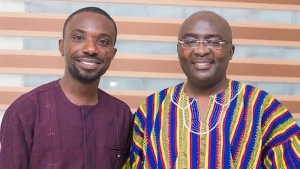Vice President John Dramani Mahama on Friday launched the afforestation component of the Savannah Accelerated Development Authority (SADA ) at Vea in the Bongo District of the Upper East Region.
Under the five-year component, 50 millions trees would be planted in the ecological zones of the Northern, Upper East, Upper West, Volta and some parts of the Brong Ahafo Regions.
The Vice President explained that the project, which would cost about GH?75 million is expected to engage more than 10,000 youth, and stressed that this would help improve the livelihoods of the people as well as protect the northern regions from desertification.
He said Ghanaians, including chiefs, school children and workers, civil society organizations would be involved in the exercise, adding that a day would be set aside in Ghana under the project for the planting of tress.
“The project is dear to government and it will not only engage the brigades that will be recruited but will involve all major stakeholders in communities particularly the chiefs”, he emphasized.
Vice President Mahama said government was committed to the implementation of SADA, and debunked the allegation being raised by some people that it was only paying lip service to SADA.
He said what have been done so far on SADA attested to the fact that government was committed to its fullest implementation.
Vice President Mahama said during the farming season last year, 6,000 small holder farmers were supported with improved seedlings, fertilizers and extension services that led to an increase in agriculture production.
“Following the success story, SADA will be supporting 16,000 small holder farmers in the Northern Savannah Ecological Zones and 30,000 fertilizers will be distributed to them including extension services and improved seeds. SADA has also added tractor services where small holder farms would be ploughed free of charge for them”, the Vice President said.
He said SADA was targeting the private sector to add values to the produce of SADA by ensuring that it partners with the sector.
The Vice President cited the recent launch of the share nut processing plant at Bupie as part of efforts to add value to produce to make it more marketable locally and internationally.
He announced that between July and August this year, SADA would establish a rice mill along the Nyankpala road in the northern region to produce 5,000 metric tones of rice per a day.
The Vice President said the defunct GIHOC factory would also be revamped to produce groundnuts oil and vegetable oil for local consumption and export.
He said under SADA, the cotton industry would be revamped to produce 32 ,000 metric tones of learn cotton this year.
“It is the intention of SADA to hit 100,000 metric tones of cotton in the near future. SADA this year has also provided 1,000 laptops to the University of Development Studies. Government this year also committed seed capital of 200 million Ghana cedis into SADA. SADA is not an event but a process and just like a tree which is required to be watered and natured to grow, so it is with SADA.”
The Vice President visited the Guinea Fowl Out Growers’ project also in the region, being implemented by the “Asongtaba Cottage Industry” in partnership with the National Youth Employment Programme.
He said SADA would support the sector to ensure that it was replicated in the northern regions to create more jobs and wealth for the people.
The Vice President said, “Guinea Fowl is a delicacy in Europe and France and Germany are the leading exporters of Guinea Fowls. SADA will empower the rearing of Guinea Fowls in the Northern ecological zones to ensure that it becomes the leading exporter in the International market”
Alhaji Gilbert Iddi, the Chief Executive Officer of SADA, reiterated that SADA has taken off fully and said under the initiative, more projects have been rolled out and more were expected to be rolled out this year, including the Sustainable Housing Initiative.
Mr. Paul Victor Obeng, a board member of SADA, said at the end of the SADA implementation, it was expected that the developmental gap between the North and the south would be bridged.
He noted that SADA would focus on addressing the agriculture, infrastructure, tourism and Industrial sectors among others.
Mr. Obeng said, ” It will work to ensure that the potentials of the northern ecological zones are exploited to the fullest to improve upon the livelihoods of the people.”
The Upper East Regional Minister, Mr. Mark Woyongo, asked the people from the area to avail themselves of the opportunity provided under SADA and work hard to create jobs to reduce rural-urban migration in the area.**
Business News of Friday, 6 July 2012
Source: GNA
Vice President launches SADA’s Afforestation Project in Upper East
Entertainment












